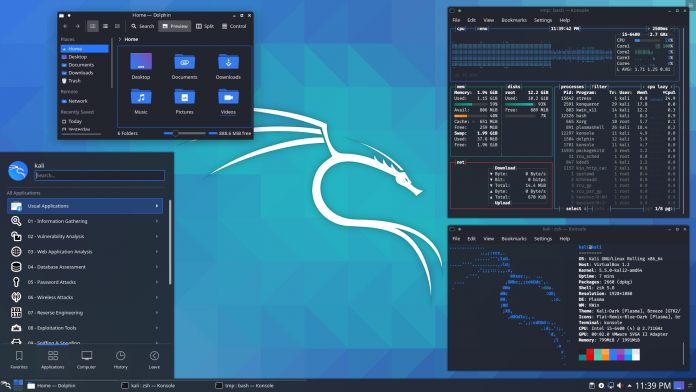Offensive Security recently announced its second release of 2020, Kali Linux 2020.2 with infrastructure improvements, PowerShell by Default, changes with login, and other features.
For those unaware, Kali Linux is one of the best Linux distros for hackers, pen-tester, and security researchers because most of the hacking tools that are available online are built-in this Linux Distro. The previous version of Kali Linux 2020.1 was released in January 2020.
What’s New In Kali Linux 2020.2?
Here’s a quick overview of what’s new in Kali Linux 2020.2:
- KDE Plasma Makeover & Login
- PowerShell by Default. Kind of.Kali on ARM Improvements
- Lessons From The Installer Changes
- New Key Packages & Icons
- Behind the Scenes, Infrastructure Improvements
KDE Plasma Makeover & Login
After introducing dark and light themes for XFCE and GNOME desktop environments, the latest release of Kali Linux 2020.2 gets the same support for KDE Plasma, a workspace environment created by KDE particularly for Linux systems.
PowerShell By Default. Kind of.
You now no longer to install Microsoft’s PowerShell via Kali Linux’s network repository. This means if you wanted PowerShell, you had to install the package as a one off by doing:
kali@kali:~$ sudo apt install -y powershell
“We now have put PowerShell into one of our (primary) metapackages, kali-linux-large. This means, if you choose to install this metapackage during system setup, or once Kali is up and running (sudo apt install -y kali-linux-large), if PowerShell is compatible with your architecture, you can just jump straight into it (pwsh)!” explains the release notes of the new version.
Kali On ARM Improvements
With Kali Linux 2020.1, desktop images no longer used “root/toor” as the default credentials to login, but had moved to “kali/kali”. The same is now applicable to ARM images (“alternate flavors” of Kali for different ARM hardware).
Changes To Installer
With Kali Linux 2020.2, Kali will no longer ship individual ISO images with different desktops environments. The new Kali Linux removes ‘kali-linux-everything’ as an install time option from the installer image. It also caches the kali-linux-large & every desktop environment into the install image allowing for a COMPLETE offline network install. Also, the customization for “live” images has been removed allowing for full offline installation.
New Key Packages & Icons
Just like every Kali Linux release, the latest version includes the latest packages such as GNOME 3.36, Python 3.8, Joplin (Offensive Security is planning on replacing CherryTree with this in Kali Linux 2020.3!), Nextnet, and SpiderFoot.
“For the time being, as a temporary measure due to certain tools needing it, we have re-included python2-pip. Python 2 has now reached “End Of Life” and is no longer getting updated. Tool makers, please, please, please port to Python 3. Users of tools, if you notice that a tool is not Python 3 yet, you can help too! It is not going to be around forever,” the release note reads.
Whilst talking about packages, there are also refreshed package logos in this new version, which will be visible in the Kali Linux menu, as well as the tools page on GitLab.
How To Download Kali Linux 2020.2?
Fresh images are already available for download. Visit the Kali Downloads page where you can find download links for ISOs and Torrents.
How To Update Existing Kali Installation?
If you have already installed Kali Linux on your computer, you can run the following command to upgrade to the new Kali Linux 2020.2 version.
echo “deb https://http.kali.org/kali kali-rolling main non-free contrib” | sudo tee /etc/apt/sources.list
sudo apt update && sudo apt -y full-upgrade
[ -f /var/run/reboot-required ] && sudo reboot -f

